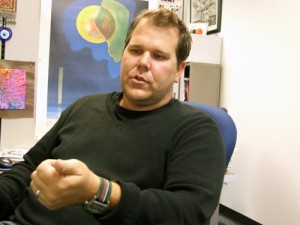First in a series
By Donald H. Harrison


SAN DIEGO — Television’s game of Jeopardy is winning plaudits from San Diego academicians who want to increase public awareness about the ethical issues, history, sociology, biology, and politics surrounding cancer.
Four San Diego-area universities and colleges–UCSD, San Diego State, Pt. Loma Nazarene and Grossmont–plan to compete in a lecture-hall version of the television game in April as a way of testing their students’ knowledge about cancer while wrapping up their joint study of Siddhartha Mukhejee’s Pulitzer-Prize-winning book, The Emperor of All Maladies: A Biography of Cancer.
English Prof. Tate Hurvitz, who coordinates the “one book, one campus” program at Grossmont College in nearby El Cajon says an advantage of the Jeopardy format is that “you create categories like ‘politics,’ or ‘biology,’ or ‘chemistry,’ and you begin to filter information or ideas into categories. I think that is a really useful skill for retention and being able to deal with information effectively and quickly. When you categorize, you are going to be able to retain the information and access it appropriately and quickly.”
UCSD Ethics Prof. Michael Kalichman serves as director of the independent Center for the Study of Ethics in Science and Technology, which has been hosting forums for inter-campus events based on Mukherjee’s book. A highlight will be a speech by Mukherjee himself at 7 p.m., Feb. 25, at UCSD.
About the Jeopardy format, Kalichman reflects: “It’s a fun way to get people involved in something by having them approach it in different ways. I am a big fan in education and in other studies of things that engage people. I am not very excited about just lecturing … I prefer that people get their hands dirty and have to get involved in the issues themselves, and there are lots of ways to do that –games are certainly one of them.”
The impetus for the four-campus Jeopardy face-off came from Grossmont College, where numerous events had been held in the Fall 2013 semester and still more are planned in the Spring 2014 semester that gets underway on Monday, Jan. 27. The backbone of Grossmont’s College “one campus, one book” program is a series of three lectures per semester on some aspect of cancer.
In the Fall, Christine Zoumas, who instructs courses on nutrition both at Grossmont and UCSD, spoke about how proper nutrition can aid cancer patients (think cruciferous vegetables like broccoli and cauliflower); Biology Prof. Allison Shearer described the formation of cancerous cells during mitosis; and Prof. Peter Schmidt described the evocative images used in television commercials by cigarette companies and anti-smoking groups.
Upcoming in the Spring, artist Stephanie Bedwell, who is herself a cancer survivor, will narrate a film explaining how the disease informs her woven sculptures, which depict life as a fragile vessel. The film was made by Ernest Carter, a student in Grossmont College’s media communications department under the supervision of Media Comm. Prof. William Snead. Other lectures will include SDSU Women’s Studies Prof. Sara Giordano discussing how cancer has impacted women in the United States, and Grossmont English Prof. Brendan Praniewicz analyzing how the use of metaphors in the “war” on cancer affect the way funding decision-makers and other people respond to the disease.
Around these lectures Grossmont College scheduled a number of interactive events during the Fall. For example, students in the school’s nursing program designed cancer-awareness posters; Zoumas teamed up with Culinary Arts Prof. Chef Joe Orate to design a meal focusing on beneficial nutrition; and Grossmont College’s debate team taught by Forensics Prof. Roxanne Tuscany argued whether “the United States Federal Government should be more supportive of clinical trials for cancer research.” That debate was so stimulating, according to Hurvitz, audience members remained in the room to continue arguing the question for well over an hour after the debate concluded. Members of the same debate team will represent Grossmont College in the Jeopardy-style competition, he added.
In the Spring semester, more ancillary events are planned before the “one campus, one book” study concludes with the Jeopardy contest. For example, said Hurvitz, Art Prof. Suda House has been organizing an exhibit in which each art faculty member along with friends of the art program are donating a single piece, with the goal of getting 100 art pieces in many different media available for sale. Then, by contributing $100, anyone who visits the exhibit in the Hyde Art Gallery may place his or her “marker” alongside a piece on exhibit, thereby claiming it. One hundred donated art pieces times $100 means $10,000 that will be donated by the Grossmont College Art Department to cancer research, according to House.
Meanwhile, Praniewicz and Rebecca Howat, a mentee under a program sponsored by the San Diego-Imperial Counties Community College Association (SDICCA), along with Andy Lamey of UCSD, are combing through Mukherjee’s book and compiling questions for the Jeopardy-style contest. Under the rules, all the questions must have answers in the book.
Hurvitz said that, as in the television show, there will be three rounds: “Jeopardy,” “Double Jeopardy” and “Final Jeopardy” with each team deciding whether they want its three members to answer questions by round or by category. “It’s up to them,” said Hurvitz.
With four teams scheduled to compete, Hurvitz hasn’t yet decided whether to have two semi-final match-ups prior to the championship, or to simply all four teams to compete at once. “It will depend on the room we use and the equipment.”
And what will he do, if there is a tie? Hurvitz was asked.
“Maybe we will have another round called ‘Really Final’ Jeopardy,” the English professor said.
*
Harrison is editor of San Diego Jewish World. He may be contacted at donald.harrison@sdjewishworld.com
Pingback: Cancer treatments raise ethical issues - San Diego Jewish World